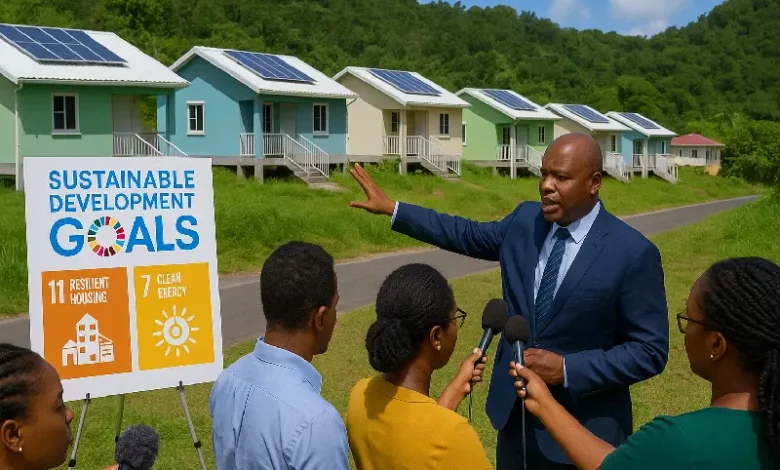Sustainable Development Goals (SDGs) in Dominica

Sustainable Development Goals (SDGs) in Dominica are closely aligned with the country’s commitment to climate resilience, economic sustainability, and inclusive development. The Government of Dominica has made the 2030 Agenda a cornerstone of national policy, embedding the 17 SDGs into planning frameworks such as the National Resilience Development Strategy (NRDS) 2030, the Climate Resilience and Recovery Plan (CRRP), and the Disaster Risk Financing Strategy. These frameworks collectively guide Dominica’s path toward sustainable growth, equity, and recovery from environmental shocks.
The 17 Sustainable Development Goals (SDGs)
Dominica recognises all 17 of the United Nations’ SDGs as essential to its national development vision:
- No Poverty
- Zero Hunger
- Good Health and Well-being
- Quality Education
- Gender Equality
- Clean Water and Sanitation
- Affordable and Clean Energy
- Decent Work and Economic Growth
- Industry, Innovation and Infrastructure
- Reduced Inequalities
- Sustainable Cities and Communities
- Responsible Consumption and Production
- Climate Action
- Life Below Water
- Life on Land
- Peace, Justice and Strong Institutions
- Partnerships for the Goals
These goals are not pursued in isolation but through integrated strategies that balance ecological sustainability with human development.
National Policy Integration and Coordination
Implementation of the SDGs is coordinated by the Ministry of Finance, Economic Development, Climate Resilience and Social Security, which chairs the National SDG Committee. This committee draws on representatives from ministries, civil society, academia, and the private sector. The Central Statistical Office (CSO) supports implementation through data collection and indicator monitoring, ensuring transparency and consistency with global benchmarks.
Key SDG-Linked Projects and Initiatives
Several national programs in Dominica illustrate direct action toward achieving the SDGs:
- Geothermal Energy and hydropower development contribute to Goal 7 (Affordable and Clean Energy) and Goal 13 (Climate Action).
- The construction of over 2,000 climate-resilient homes supports Goal 11 (Sustainable Cities and Communities) while improving livelihoods post-disaster.
- Education reforms and curriculum enhancements that promote civic responsibility and environmental literacy are aligned with Goal 4 (Quality Education).
- Efforts to restore and protect marine and forest areas contribute to Goal 14 (Life Below Water) and Goal 15 (Life on Land).
- Programs targeting entrepreneurship, agro-processing, and eco-tourism support Goal 8 (Decent Work and Economic Growth) and Goal 12 (Responsible Consumption and Production).
Progress and Challenges
While Dominica has made notable advances in climate resilience and sustainable energy, challenges remain. These include financing gaps, vulnerability to external shocks, limited technical capacity, and the need for stronger data systems. Still, the country’s policy focus has earned regional and international recognition, particularly for its leadership in disaster recovery and environmental protection.
Future efforts will prioritise:
- Closing digital divides and enhancing access to Goal 9 (Industry, Innovation and Infrastructure)
- Improving gender participation in policy and economic life to achieve Goal 5 (Gender Equality)
- Strengthening governance systems in line with Goal 16 (Peace, Justice and Strong Institutions)
- Expanding cooperation through Goal 17 (Partnerships for the Goals)




